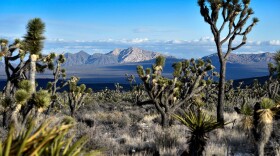-
Copper is essential to modern technology. But Smith Valley residents worry about a mine’s effect on their water
-
Copper is essential to modern technology. But Smith Valley residents worry about a mine’s effect on their water
-
Nevada Indigenous leaders brace for attacks on protected sacred lands.
-
Got a high-clearance vehicle? If so, then you can bag this 7,000-footer in the winter sun
-
-
Relishing monsoon season in a land of persistent drought
-
NV Energy’s Greenlink West Project rankles conservationists with shortcut through Tule Springs
-
The Colorado River was once home to a six-foot-long pikeminnow. Where did it go?
-
When we talk about environmental issues in Nevada, we often focus on water. But global warming is damaging Nevada’s environment in ways that aren’t so visible.
-
The fight over Thacker Pass, a lithium-rich area in Northern Nevada, has been raging for months.
© All Rights Reserved 2026 | Privacy Policy
Tax ID / EIN: 23-7441306
Tax ID / EIN: 23-7441306

Play Live Radio
Next Up:
0:00
0:00
Available On Air Stations
Supported by









